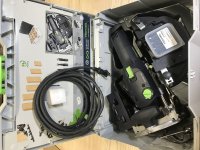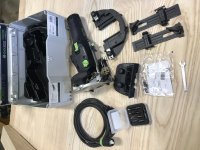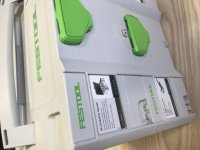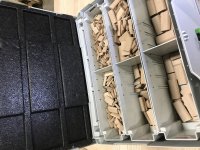Here's my advice (my apologies, in advance, for the length of the following response):
I've come across all manner of used-tool sellers, ranging from totally honest and professional people to others who shouldn't be allowed to mingle with the public. Sadly, more often than not (at least nowadays), I'm encountering dishonest sellers. Therefore, here's the list of questions that I always make sure to ask the seller of a used Festool tool [accompanied by my
italicized editorial comments]:
1) Are you the tool's sole original owner?
[In my experience, often times less than scrupulous sellers will conveniently neglect to mention that they purchased the tool at a pawn shop or from an estate sale, meaning that a) they are obviously not the first owner and b) they have no idea how many owners the tool has had or what kind of use or service it may have experienced. To me, a tool's provenance is everything.]
2) If you are in fact the first and only owner, what month and year was the tool purchased? Also, was the tool purchased from an authorized Festool retailer and do you know if the tool was ever registered with Festool?
[If I have any inkling that the tool may have been purchased from an entity located beyond the borders of North America I'll request that the seller confirm that the tool is a North American version.]
3) Is the tool refurbished and/or has it ever been sent in for service or has service of any kind ever been attempted on it?
[You wouldn't believe how common it is for sellers to leave out the fact that their tool is actually a refurbished model!]
4) If you are not the machine's first owner, please explain how you came to be in possession of it.
[Here, I am trying to gain some assurance that the tool is not stolen property.]
5) What is the month and year of manufacture?
[This info appears on the motor tag as a four digit code ("xx/xx". In the absence of a purchase date and if the tool was never registered, Festool will honor warranty claims based on the date of manufacture.]
6) What is the serial number?
[With this info you can check the machine against any of the various online repositories of data on stolen goods. Obviously, a scratched-out serial number likely points to the tool being stolen.]
7) Does the machine or anything that accompanies it suffer from any known deficiencies? Examples include, but are not limited to, water and/or smoke damage, odd or concerning motor noises or smells, missing or broken parts, cracks, dents, tears, cuts, splits, mold, etc.
8. How was the machine used? For example, was it used by a weekend hobbyist in a home shop or onsite by a professional contractor?
[Here, I am seeking info that will help me determine the maximum price that I am willing to pay for the used tool. A tool that doesn't have much life left has different value from one only used sparingly. That said, an eight year old tool that was only once or twice and only then shortly after purchase and has been sitting on a shelf ever since is worth less to me than a similarly aged tool that has seen light but regular use over its entire life. This is because, in the case of the former, there's little in the way of a proven track record to assure me that the tool isn't a lemon (or is otherwise harboring gremlins) - and because it lacks any warranty protection, this factor must be taken into account.]
9) What was the machine used to accomplish?
[Here I am trying to gain some insight as t whether or not the tool was used responsibly. For example, I'd want to know if a prior owner had ever used it to plow mortises in concrete (hey, you never know!).]
10) Are you able to supply the original or an anonymized copy of the bill of sale?
11) And, specific to a Domino, I would want to know that a) the fences are suitably flat and coplaner (or whatever the word is that describes the fences being properly aligned to each other - not twisted or racked, etc.) and d) that both the 0 degree and 90 degree fence settings are dead nuts. Moreover, I would want to make sure that all of the various locking mechanisms are functional and that no slop is present when everything is locked down.
12) Finally, if I could see and handle the tool - and aside from running it and trying it out on some material that I brought for the task - I would check the condition of the male and female ends of the Plug-It cord
[I'm looking here for any tell-tale scorching around the interface that would point to a plug assembly that is about to fail.]
Based upon all of the above I arrive at what I think is a fair price and I stick to it no matter the response from the seller, even going so far as to often share the logic I used to arrive at said value.
Here's the basis for my logic:
When I am debating the purchase of a
new Festool (over a
used Festool), I always deduct the retail value of the included systainer (assuming it ships with one), the value of the free shipping to my door and I attribute some value to the 30-day return window and the 3-year warranty (the latter two of which I consider as insurance or peace of mind). Note - the value I attribute for the "insurance" is dependent ipon the amount of use I am projecting that the tool will see over the coming three years. The more use, the more value I attribute to it. Also, I attribute some additional value to the long trip it took in a container from Germany prior to its arrival on these shores and I account for the non-sweatshop nature of the tool's production (which, for me, is huge).
Now, since you're looking at a used DF500, I'll use that as an example:
I see that the current retail price for a brand new version in Canada is CDN$2036. Were I were thinking about buying a brand new version, I would right off the bat deduct, say, CDN$450 from that price to arrive at the value of the tool minus the systainer, the "insurance" and the free shipping (after all, nothing is truly "free"). Doing this helps greatly in coming to terms with what is often serious sticker shock. If I then consider, say, a lightly used version of the same tool from a local-to-me seller, I won't offer anything more than $1170. Now, the problem with offering less than this, is Festool's excellent resale value. Remember, you're competing with many buyers, most of which will fail in accomplishing their due diligence and many of which will have bought into the notion that even a 10% reduction in the price from new makes a used tool a good buy. FWIW in many cases I would have to disagree with this opinion.
Anyways, if the seller is reasonable and if the tool is a good find I would buy it (assuming that their asking price is set at or below the highest amount I am willing to offer). If, on the other hand, their asking price is too high, I would submit my offer along with the logic I used to arrive at same. Put simply, I would deduct various amounts from the price of a new tool (or, rather, the derived value of a new tool - meaning the retail price minus the insurance, free shipping, etc.) for anything that detracts from the value. Now, if my offer amount doesn't jive with what the seller is willing to accept, I simply move on.
OK, what I haven't admitted until now is that when it comes to Festool tools in the North American market, often there is no good alternative to buying new. That said, there
is an attractive workaround that can make purchasing a new tool more palatable. If you'd like to know what it is, you can private message me.
I hope this helps.





